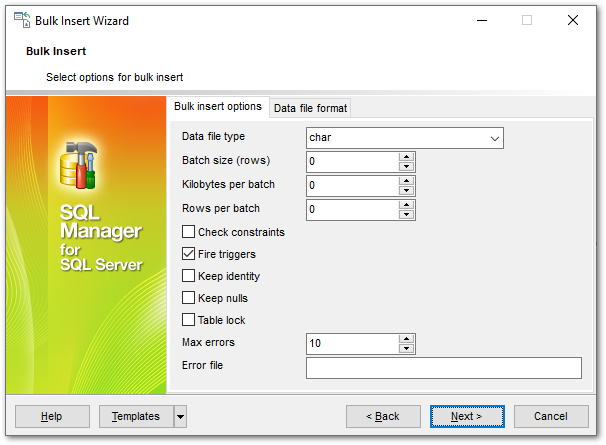Online Documentation for SQL Manager for SQL server
Setting bulk insert options
Data file type
Use this drop-down list to select the data file type value to be used to perform the load operation. Possible data file type values are: char, native, widechar and widenative.
Batch size (rows)
Specify the number of rows in a batch. Each batch is copied to the server as one transaction. If this operation fails, SQL Server commits or rolls back the transaction for every batch.
Kilobytes per batch
Specify the approximate number of kilobytes (KB) of data in each batch.
Rows per batch
This value indicates the number of rows in each batch.

![]() Check constraints
Check constraints
Enable this option to specify that all constraints on the target table or view must be checked during the bulk insert operation. If disabled, any CHECK constraints are ignored, and after the operation the constraint on the table is marked as not-trusted. This might be necessary if the input data contains rows that violate constraints.
Note: UNIQUE, PRIMARY KEY, FOREIGN KEY and NOT NULL constraints are always enforced.
![]() Fire triggers
Fire triggers
Use this option to specify that any insert triggers defined on the destination table execute during the bulk load operation. If triggers are defined for INSERT operations on the target table, they are fired for every completed batch.
![]() Keep identity
Keep identity
Use this option to specify that identity value or values in the imported data file are to be used for the identity column. If this option is not checked, the identity values for this column are verified but not imported, and SQL Server automatically assigns unique values based on the seed and increment values specified during table creation.
![]() Keep nulls
Keep nulls
Use this option to specify that empty columns should retain a null value during the bulk load operation, instead of having any default values for the columns inserted.
![]() Table lock
Table lock
Use this option to specify that a table-level lock is acquired for the duration of the bulk load operation. Holding a lock for the duration of the bulk load operation reduces lock contention on the table and may significantly improve performance.
Max errors
Specifies the maximum number of syntax errors allowed in the data before the bulk insert operation is canceled. Each row that cannot be imported by the bulk load operation is ignored and counted as one error.
Note: This option is not applied to constraint checks and to converting money and bigint data types.
Error file
Specify the file used to collect rows that have formatting errors and cannot be converted to an OLEDB rowset. These rows are copied into this error file from the data file "as is". The error file is created when the command is executed.
Click the Next button to proceed to the Customizing data file format step of the wizard.


































































